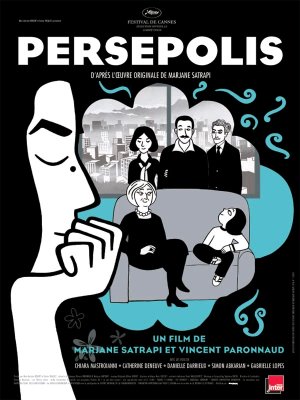I rented Persepolis before the recent Iranian election, and have been thinking ever since about the film.
Persepolis is adapted from the autobiographical graphic novels written by Marjane Satrapi (which I haven’t read), and represents the first graphic-novel-as-film. Other graphic novels have been made into films, but none (to my knowledge) have remained as true to form as this. Visually, the film is lovely, stark, and at times deeply disturbing.
 In Persepolis, we meet Marjane, a young girl living in Iran at the time of the Islamic revolution of 1979. The society changed drastically under Islamic law, as evidenced by Marjane’s teacher’s evolving lessons. After the revolution, in 1982, she tells the young girls, who are now required by law to cover their heads, “The veil stands for freedom. A decent woman shelters herself from men’s eyes. A woman who shows herself will burn in hell.” In typical fashion, the students escape her ideological droning through imported pop culture: the music of ABBA, The Bee Gees, Michael Jackson, and Iron Maiden.
In Persepolis, we meet Marjane, a young girl living in Iran at the time of the Islamic revolution of 1979. The society changed drastically under Islamic law, as evidenced by Marjane’s teacher’s evolving lessons. After the revolution, in 1982, she tells the young girls, who are now required by law to cover their heads, “The veil stands for freedom. A decent woman shelters herself from men’s eyes. A woman who shows herself will burn in hell.” In typical fashion, the students escape her ideological droning through imported pop culture: the music of ABBA, The Bee Gees, Michael Jackson, and Iron Maiden.
The history of Iran, while it determines the course of Marjane’s life, really is a backdrop—especially in the second half of the movie. In other words, the film is more about the experience of one woman than a documentary-style account of Iranian history. Once Marjane escapes the society she grew up in, her problems become much more ordinary for a Western audience, more commonplace. She vacillates between different crowds of people. She falls in love and has her heart broken. She feels angst and confusion over who she is and what she wants. She goes home to Iran for a time and, like so many others, ultimately finds she cannot return home.
As evident in the film, Satrapi grew up in a wealthy, educated, progressive Iranian family. They sent her to Vienna as a teenager so she didn’t have to spend her adolescence in such a repressive society, and because they feared what might happen to such an outspoken young woman there. While acknowledging her privilege, not many women in circumstances other than these would be able to accomplish what she has.  Satrapi isn’t afraid to show missteps she makes in growing up, either. Young Marjane learns that her femininity, even when repressed by law, offers great power—and shows how she misuses that power. Missing her mother’s lesson at the grocery store about female solidarity, she blames other women for her troubles (“Ma’am, my mother is dead. My stepmother’s so cruel. If I’m late, she’ll kill me. She’ll burn me with an iron. She’ll make my dad put me in an orphanage.”), and falsely accuses a man of looking at her in public to avoid the law coming down on her.
Satrapi isn’t afraid to show missteps she makes in growing up, either. Young Marjane learns that her femininity, even when repressed by law, offers great power—and shows how she misuses that power. Missing her mother’s lesson at the grocery store about female solidarity, she blames other women for her troubles (“Ma’am, my mother is dead. My stepmother’s so cruel. If I’m late, she’ll kill me. She’ll burn me with an iron. She’ll make my dad put me in an orphanage.”), and falsely accuses a man of looking at her in public to avoid the law coming down on her.
Persepolis is, in every definition of the term, a feminist film. There are strong, interesting female characters who sometimes make mistakes. The women, like in real life, are engaged in politics and struggle with expectations set for them and that they set for themselves. They have relationships with various people, but their lives are not defined by one romantic relationship, even though sometimes it can feel that way.
As much as I like this movie, I can’t help but write this review through the lens of an interview Satrapi gave in 2004, in which she claimed to not be a feminist and displayed ignorance of the basic concept of feminism. I simply don’t believe gender inequality can be dissolved through basic humanism — especially in oppressive patriarchal societies like Iran. I wonder if feminism represents too radical a position to non-Westerners, and if her statements were more strategy than sincerity. Making feminism an enemy or perpetuating the post-feminist rhetoric isn’t going to help anyone. That said, this is a very good movie and I highly recommend it.
The Nation: Icons of the New Iran by Barbara Crossette
Feminist Peace Network: Memo to ABC: Lipstick Revolution FAIL
——


About “Missing her mother’s
lesson at the grocery store about female solidarity, she blames other
women for her troubles (“Ma’am, my mother is dead. My stepmother’s so
cruel. If I’m late, she’ll kill me. She’ll burn me with an iron. She’ll
make my dad put me in an orphanage.”),” – If she was talking to those female vice officers who were questioning her, she was lying to them. It was all a concocted story in order to make them let her go.
In actuality her mother WAS alive and is still alive today.